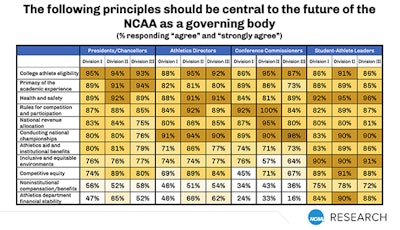The NCAA has released the results of a survey administered by its Constitution Committee that sought to identify current NCAA constitutional elements that should carry into the future and solicited suggestions for modernization and improvement.
According to an executive summary of the results, the surveys were completed by 3,492 campus, conference and coaches association administrators or executives, and 1,362 student-athlete leaders. Athletics directors and conference commissioners had the highest response rates, with over 75 percent participation association-wide. Half of all faculty athletics representatives and 41 percent of presidents and chancellors at NCAA member schools completed the survey.
Across the membership, a substantial majority (over three-quarters) within each role by division agreed that the following principles were central to the future of the NCAA as a governing body: conducting national championships, the primacy of the academic experience in policy and decision making, sport-specific rules for competition and participation, standards for allocating national revenue, standards for college athlete eligibility, and standards for college athlete health and safety.
“The Board of Governors Constitution Committee sought input from a broad base of experts and leaders to identify how the NCAA constitution should be transformed to best meet the needs of college athletes. More than 4,800 campus administrators and college athletes provided survey input and their viewpoints will inform the committee's work,” read a statement from the association on the results. “In November, the committee will submit a working draft of its proposals for membership feedback, which will be discussed at a special virtual convention Nov. 15. The final proposals will be provided to the NCAA Board of Governors by Dec. 15 and scheduled for votes in January by the full NCAA membership at the Association's national Convention in Indianapolis.”

Over 90 percent of student-athlete leaders within each division agreed that standards for inclusive and equitable environments were central to the future of the NCAA. Such standards also received over 70 percent agreement within each administrative role and division, with the exception of Division II and Division III conference commissioners at 57 percent and 64 precent respectively. Survey participants were able to suggest additional principles the committee could consider during redrafting. Suggestions included amateurism, diversity and inclusion, gender equity, student-athlete development and student-athlete mental well-being. In addition, over 75 percent of student-athlete respondents endorsed each of the sub-principles of the current constitutional principle of student-athlete well-being: overall educational experience; cultural diversity and gender equity; health and safety; student-athlete/coach relationship; fairness, openness and honesty; and student-athlete involvement.
Approximately one-third of Division II and Division III leaders surveyed agreed that the current divisional structure needs to change. This was higher in Division I, with a slight majority of respondents endorsing such a change. However, when breaking out responses by those in Division I autonomy and non-autonomy conferences, over two-thirds of autonomy conference administrators supported such a change to the structure as compared with approximately 45 percent of non-autonomy conference administrators in Division I.
Those who agreed that the current divisional structure was in need of change received an open-ended prompt asking them to describe their vision. Comments included calls to increase the number of divisions (often calling for an expansion of Division I, or in some cases Division III); break the autonomy conferences out of Division I and permit self-governance; reconsider Division I subdivisions by extracting FBS football from NCAA oversight; and restructure divisional membership, taking into account geography, campus enrollment or resource level.
A summary deck of the results can be found here.





































